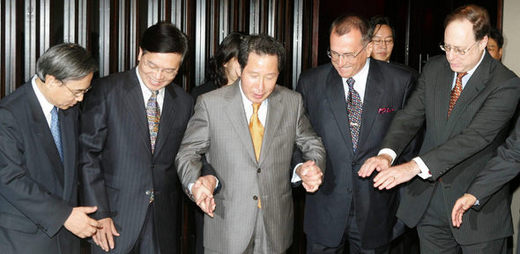 |
|
Ruling Uri Party chairman Kim Geun-tae (center) stands hand in hand with the ambassadors to Seoul of the other nations involved in the six-party talks regarding the North Korea nuclear issue. From left are Shotaro Oshima (Japan), Ning Fukui (China), Chairman Kim, Gleb Ivashentsov (Russia), and Alexander Vershbow (U.S.).
|
U.S. ready for bilateral talks with N.K., Vershbow reaffirms
"If North Korea clearly show its willingness to return to the six-party talks, Washington can hold bilateral talks with Pyongyang even before the next round of six-party talks," said U.S. Ambassador Alexander Vershbow on September 18. Ambassador Vershbow made the comment at a lunch meeting hosted by Rep. Kim Geun-tae, chairman of the ruling Uri Party, according to Uri spokesperson Woo Sang-ho. Ambassadors from the U.S., Japan, Russia, and China - four of the nations involved in the stalled six-party talks on North Korea’s nuclear weapons program - attended the meeting. In response to North Korean No. 2 man Kim Young-nam’s remarks that "we will never join the talks while wearing a ’gokkal’ [dunce cap] of sanctions put on us," Vershbow expressed concern whether North Korea truly has an intention to return to the negotiations, added Woo. Vershbow reportedly expressed wariness over possible North Korean further action, saying, "It takes two to tango, but North Korea doesn’t accept this. If North Korea takes another action [such as another missile launch or a nuclear test], the situation will worsen."In connection with the first anniversary of the September 19 Joint Statement agreed to at the fourth round of six-party talks, "The statement includes all the contents necessary for a comprehensive approach. The U.S. wants to push ahead with an agenda including such items as concluding a peace treaty on the Korean peninsula, normalizing diplomatic relations with North Korea, and restructuring and developing the North Korean economy, but they are possible only when the communist regime abandons its nuclear weapons program," the U.S. ambassador said. Regarding the South Korea-U.S. summit held in Washington on September 14, "The summit was very important for the partnership between the two countries. President George W. Bush clarified the U.S. position of solidly supporting security on the peninsula, and he also mentioned plans to strengthen the two nations’ alliance through the Seoul-Washington free trade agreement (FTA) and visa exemption," said Vershbow. In relation to Foreign Minister Ban Ki-moon’s running for the post of U.N. secretary-general, "Since heads of the two nations have evaluated him positively, I won’t state the U.S. position again [here]," said Ambassador Vershbow. "I wish the best for Minister Ban, who is an excellent diplomat," he added.





